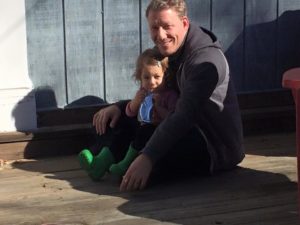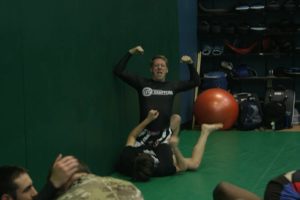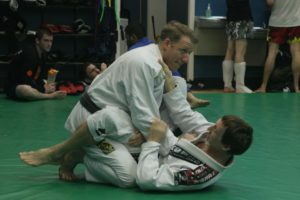An Interview with Rudy Fischmann
by: Daniel Frank
Rudy Fischmann has been a friend of Revolution BJJ for a long time. Recently he has fallen on hard times and luckily we have been in a position to help him just a little bit. I sent Rudy a few questions so that all of the students at Revolution BJJ could get to know him as well.
Tell me about your early life. Where were you born and where did you grow up? I grew up in the mid-west – Minnesota, Indiana, and Michigan. I’d identify as Detroit area Michigander most.
How did you get into jiu jitsu and where did you begin training? I wound up living in LA after college and discovered BJJ after a friend invited me to her first tournament. I thought grappling was the silliest thing I had ever seen so naturally I had to try it. I signed up for classes in May of 2000, with John Machado, and fell in love with the art form almost immediately.
How did your BJJ career develop from white belt to black belt? Did you stick in one place or did you move around to multiple gyms? Who were your major influences during this time? Over the years, I trained with Eddie Bravo and Wander Braga diligently until receiving my black belt from Wander in December of 2008. I competed a ton and always sought out open mats and studied training sessions as a way to expedite my training. Most beneficial to me was probably analyzing drilling with the help of some very high level coaches (Felicia Oh, Brian Peterson, and Johnny Ramirez) on an almost weekly basis at a friendly open mat. I’d describe my style as more cerebral than physical. I’ve always been weak and uncoordinated (and honestly I probably had early signs of my tumor impacting that- doctors think it started growing when I was a kid) so BJJ is a great martial art for me. I never really studied instructional materials, but I was a big fan of Marcelo Garcia and the Camarillo Brothers. My outreach increased over the years as I dug into training and competing. I became very friendly with high level players in the Bay Area, NYC, Arizona, Vegas, and RVA. I would credit Andrew Smith and Trey Martin as two of the finest BJJ minds/coaches/people in the country.
 Aside from jiu jitsu, what else have you done with your life, professionally? I worked as a television producer/documentarian for programs on history, science, and crime. The deeper I got into BJJ, the more I thought about it and when I was doing BJJ, I wouldn’t think about anything at all. I made friends from all walks of life and was able to travel all over.
Aside from jiu jitsu, what else have you done with your life, professionally? I worked as a television producer/documentarian for programs on history, science, and crime. The deeper I got into BJJ, the more I thought about it and when I was doing BJJ, I wouldn’t think about anything at all. I made friends from all walks of life and was able to travel all over.
How did you get into the business of owning your own BJJ gym? How did your life change because of this? I picked up some MMA skills working with a couple fighters who fought in Pride and the UFC at a low level. I developed as a much better coach than competitor so as I burned out on my job I began thinking of opening my own gym since I had also really enjoyed working with beginners. The opportunity came when my instructor at the time, Wander Braga, was deported so I wound up taking over his academy. By focusing on a family vibe, like at Revolution BJJ, the gym called M3 Fight and Fitness grew quickly from 30 students to 300 in 18 months. There were mostly people with three years or less experience. Life/work took me to Knoxville, TN where I trained considerably with MMA fighters which really improved my striking and wrestling. After that, I moved to RVA where I worked with Andrew and Trey to improve the overall experience of their unique intro program though it was largely in place before my arrival. In my opinion, a basic intro program is a perfect way to get started in BJJ. It gives a basic tool set to remove the intimidation factor and places the student in an environment where everyone is starting at about the same level. I’ve since sold my gym but it still exists today.
Can you tell us a little bit about your family life? I am married and have two small children, 5 and 3. Owning a gym proved to be different than training so my focus is back to just being a student now and an occasional coach in class and in competition.
You were recently diagnosed with brain cancer. How drastically has this changed everything in your life? How are the treatments going? What is next? I was diagnosed with stage 2 astrocytoma tumor with stage 4 properties on July 9, 2018 after doctors misdiagnosed me as having vestibular migraines. They did an MRI just to rule out the unlikely but it turned out that I had won the worst lottery ever as my tumor type is incredibly rare. Two revision surgeries quickly followed and I’ve been recovering ever since. I’ve gone through radiation and several rounds of pill based chemotherapy. I have been left with really bad balance and fatigue which I hope to rehab past in the coming months. Plans have already begun to get back to BJJ as part of that but I’ll be focusing on basics. BJJ is a journey. It has made me tougher in this recovery process. It is like looking for that one little opening to escape or tighten a choke. I won’t let the frustrations of my recovery get me down.
If you could offer one piece of advice to a student that signed up for jiu jitsu today, what would it be? Don’t be afraid of new ideas but remember it always comes back to the basics.
Hopefully, Rudy can make a full recovery and find his way back to Revolution BJJ to get some more rolls in. Now, that you know more about him hopefully you will get to roll with him too.